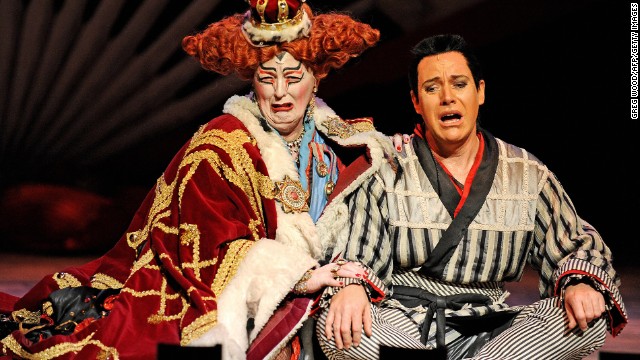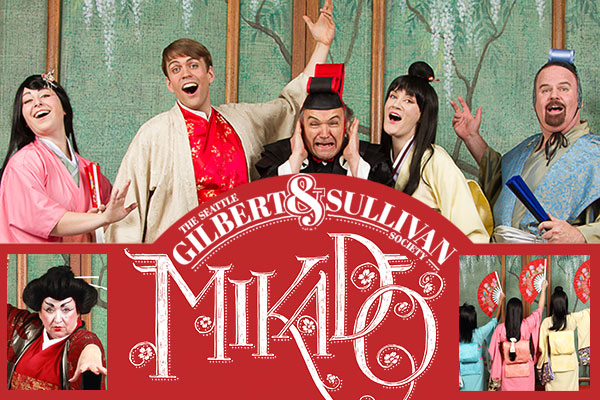The Seattle Gilbert and Sullivan Society’s production of comic-opera “The Mikado” has caused controversy due to the nature of the show and the production’s use of White actors to play Japanese characters. LA-based community organizer Sean Miura (@seanmiura) reflects on his experience with the “The Mikado” and the society’s response to the backlash.
I hold a special place in my heart for the people of Seattle.
Seattle is the city where my great grandmother settled after leaving Japan, going on to raise four daughters as a single mom. Seattle is where my great uncle crossed the Bainbridge Island pier to board boats to buses to trains to concentration camps in the wake of Pearl Harbor hysteria. Seattle is where my mother moved after law school, became chapter president of the local JACL, fought for redress and reparations, and fought to right the conviction of a man who resisted being imprisoned in a World War II concentration camp. Seattle is where my mom met my dad. Seattle is where I was born.
Seattle is not where I grew up, but Seattle was the closest I had to an Asian American community with the International District, Uwajimaya food court lunches, and the salmon my uncle Tike would catch fresh in the mornings. My mom drove me, 10 years old at the time, from our home in Vancouver to see David Henry Hwang’s “Golden Child” at the Seattle Reparatory Theater, the first time I saw Asian Americans telling our own stories live.
I saw The Mikado a couple years later.

My memory of the local production is fuzzy, but I remember not enjoying it. At that point, though not yet a teenager, I had grown accustomed to stereotypes and racism. When you look like I do it comes with the territory. But I remember feeling uneasy with the makeup, the hair, and those infamous names. I knew enough Japanese to understand that these names – Titipu, Yum-Yum, and Pish-Tosh among others — could not be actual Japanese names. But somehow this all still took place in Japan?
It would be years before I fully understood and was able to parse out why this production (not just the production, but the play itself) didn’t sit properly. As I built my vocabulary and saw more and more work like “The Mikado”, I was able to trace connections between what happened on-stage with larger systems of oppression that have fed off of cultural misrepresentation. The camps did not happen overnight. The camps did not end overnight.
“The Mikado” is a classic Gilbert & Sullivan opera which, true to much of their work, comments on Victorian British society. This particular piece uses Japanese iconography (only a few decades earlier the American military pulled Japan out of its self-imposed solitude by force, leading to a resurgence of Orientalism in Europe concurrent with newly global access to Japanese art) as a way to hide criticism of British institutions. At that time Japan was seen as exotic and almost imaginary, a trope that still survives today. A crude parallel would be the way JK Rowling utilizes the fictional world of her Harry Potter series to critique real life, contemporary government and social structures today.
The inherent problem approaches. Rowling creates a fantastical alternative universe to house her criticism, whereas G&S usurp a real place and repurpose it as fantasy. Rowlings’ tactic allows her to create an imaginary culture that fits and augments the agenda of her writing, whereas G&S’ use of an actual setting forces themselves to either conform to existing structures and derive forced metaphor, or to essentially commit literary colonization through subjugation of a people’s culture and country to suit their own end.
In a nutshell, Hogwarts can be a metaphor because it is an imaginary place. Japan is not an imaginary place.

So when a play such as “The Mikado” is presented in America, not only are we forced to confront its antiquated/colonial approach to satire but we’re also forced to confront the history of East Asian people in America who have had to deal with its aftermath. On an academic level we can understand what Gilbert & Sullivan were attempting and we can understand why it worked and we can rationalize why its racial tropes were not unsettling to Victorian British society. But, as with most art, the piece evokes an emotional response along with the intellectual. In a different country and over a century and a half after the time of Gilbert & Sullivan, we can’t strip productions of “The Mikado” from the context in which they are presented or from the humans who live within and contribute to that context.
I am not a metaphor. My cultural heritage, the practices I was raised with, and my name come from generations and generations of connection to the ground our people have stood on, whether in Seattle, Los Angeles, Fukushima, or Fukuoka. Lampooning White aristocracy by using Japan as a vessel does not justify contributing to the constant belittlement of my ancestors, my family, and myself. It causes collateral damage.
I have not seen the Seattle Gilbert and Sullivan Society performance of “The Mikado” so I cannot comment on the actual show, but I am extremely disappointed in the responses offered by the company. However, I have grown accustomed, if not more resistant to, stereotypes, racism, and the voices that will reinforce them to preserve the status quo.
When you look like we do it comes with the territory. There is much more work to be done.
Read More:
- Seattle Times: The yellowface of “The Mikado” in your face by Sharon Pian Chan
- CNN: Yellowface staging of “Mikado” has to end by Jeff Yang
____
This has been a guest-post by Sean Miura (@seanmiura). Sean is an LA-based community activist and organizer, curator of the long-running community art series Tuesday Night Project, and the former Mr. Hyphen of 2013.
Update: The Seattle Repertory Theater has clarified their relationship to the Seattle Gilbert & Sullivan Society and this production of “The Mikado”; specifically, that they did not make the decision to rent their stage to the G & S society and are not responsible for the production. Instead, the Society’s “Mikado” production appears on a Seattle Rep stage because of a contract between the Rep and the City of Seattle. The Seattle Rep has also committed to holding a community townhall on art, race and cultu

